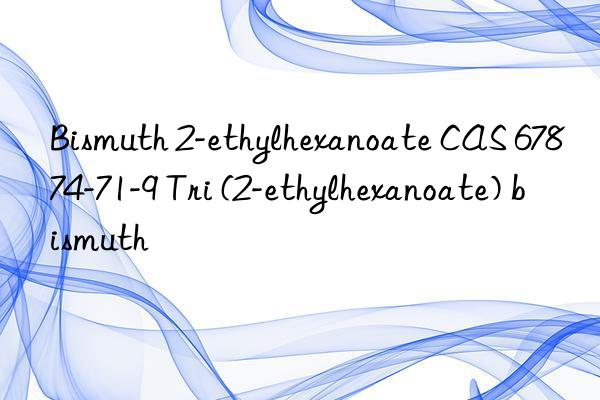
Overview:
Chinese alias: Bismuth ethylhexanoate, Bismuth tris (2-ethylhexanoate), Bismuth isooctanoate
Nicknames: BDMA, dimethylbenzylamine, benzyldimethylamine, catalyst BDMA, hard foam catalyst BDMA, N-benzyldimethylamine, BDMA, CAS 103-83-3, Lupragen N103,
Bismuth isooctanoate
Bismuth 2-ethylhexanoate
CAS 67874-71-9
Chinese name: Bismuth 2-ethylhexanoate
English alias
BiCAT HM2 ethylhexanicicismuth (3+) saltBi Hex CemCoscat 28Bismuth Hex CemBorci Kat 242-Ethylhexanicicid, bismuthsaltBismuth (3+) 2-ethylhexanate
Molecular formula: Bi [OOCCH (C2H5) C4H9] 3
Relative molecular weight: 638.61
CAS number: 67874-71-9
Physical and chemical properties:
Bismuth isooctanoate is a light yellow transparent oily liquid under normal conditions.
Viscosity (25 ℃): 50mPa. s
Density (25 ℃): 1.22g/cm3
Water solubility: insoluble in water
Flash point (PMCC): 158 ℃
Hydroxyl value: 0
Boiling point: 228 ° Cat760mmHg
Flash point: 116.6 ° C
LogP: 6.63090
Color: Brown liquid.
Solubility: Undetermined.
security information
Packaging level: III
Hazard category: 3
Dangerous goods transportation code: 1993
Hazard category code: R36/37/38
Safety instructions: S26; S36; S37; S39
Application:
Bismuth isooctanoate is a bismuth metal carboxylate catalyst that can be used as an auxiliary catalyst for tertiary amines to accelerate the reaction and curing of amino acid esters; Bismuth isooctanoate can be used to replace tin metal catalyst in soft block foam, high-density soft foam, spray foam, microporous foam and hard foam system.
Bismuth isooctanoate
Bismuth 2-ethylhexanoate
67874-71-9
Storage and transportation:
Should be sealed and stored in a dry, cool, and ventilated warehouse
Packaging:
200KG/barrel storage: It is recommended to store in a dry and cool area with appropriate ventilation. Please tighten the packaging cover as soon as possible after the original packaging to prevent water ingress and other substances from affecting product performance. Do not inhale dust and avoid contact with skin and mucous membranes. Smoking, eating, and drinking are prohibited in the workplace. After work, take a shower and change clothes. Store contaminated clothes separately and reuse them after washing. Maintain good hygiene habits.
Related reading recommendations:


 微信扫一扫打赏
微信扫一扫打赏

